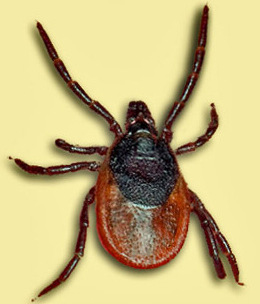Ixodes persulcatus, the taiga tick, is a species of hard-bodied tick distributed from Europe through central and northern Asia to the People's Republic of China and Japan.[1] The sexual dimorphism of the species is marked, the male being much smaller than the female.[2] Hosts include wild and domestic ungulates, man, dog, rabbit, and other small mammals, including the dormouse, Amur hedgehog, and occasionally birds.[3]
| Ixodes persulcatus | |
|---|---|

| |
| Scientific classification | |
| Domain: | Eukaryota |
| Kingdom: | Animalia |
| Phylum: | Arthropoda |
| Subphylum: | Chelicerata |
| Class: | Arachnida |
| Order: | Ixodida |
| Family: | Ixodidae |
| Genus: | Ixodes |
| Species: | I. persulcatus
|
| Binomial name | |
| Ixodes persulcatus (Schulze, 1930)
| |
Disease transmission
editIxodes persulcatus ticks transmit Lyme disease, relapsing fever (Borrelia miyamotoi), babesiosis, and Siberian (TBEV-Sib) and Far Eastern (TBEV-FE) tick-borne encephalitis,[1][4] and probably human granulocytic anaplasmosis as well.[5] A recent study of the northernmost tick-borne encephalitis focus in Simo, Finnish Lapland, found I. persulcatus ticks in scattered foci along the western coast, including the Kokkola archipelago and Närpes municipality, demonstrating a northward movement of foci and an unusual combination of the TBEV-Eur strain and I. persulcatus ticks in an area with no evidence of cocirculation of tick species or TBEV subtypes.[1]
References
edit- ^ a b c Anu E. Jääskeläinen; Elina Tonteri; Tarja Sironen; Laura Pakarinen; Antti Vaheri; Olli Vapalahti (2011). "European subtype tick-borne encephalitis virus in Ixodes persulcatus ticks". Emerging Infectious Diseases. 17 (2): 323–325. doi:10.3201/eid1702.101487. PMC 3376769. PMID 21291624.
- ^ Yung Bai Kang; Du Hwan Jang (1985). "A description with scanning electron microscopy on the tick Ixodes persulcatus (Schulze, 1930) male and female specimens". Kisaengch'unghak chapchi [The Korean Journal of Parasitology]. 23 (2): 305–312. doi:10.3347/kjp.1985.23.2.305. PMID 12888675.
- ^ James E. Keirans; Glen R. Needham; James H. Oliver Jr. (1999). "The Ixodes ricinus complex worldwide: diagnosis of the species in the complex, hosts and distribution". In Glen R. Needham; Rodger Mitchell; David J. Horn; W. Calvin Welbourn (eds.). Acarology IX, Volume 2, Symposia. Columbus, Ohio: The Ohio Biological Survey. p. 344. ISBN 978-0-86727-123-2.
- ^ Marina E. Eremeeva; Alice Oliveira; John Moriarity; Jennilee B. Robinson; Nikolay K. Tokarevich; Ludmila P. Antyukova; Valentina A. Pyanyh; Olga N. Emeljanova; Valentina N. Ignatjeva; Roman Buzinov; Valentina Pyankova; Gregory A. Dasch (2007). "Detection and identification of bacterial agents in Ixodes persulcatus Schulze ticks from the north western region of Russia". Vector-Borne and Zoonotic Diseases. 7 (3): 426–36. doi:10.1089/vbz.2007.0112. PMID 17767409.
- ^ Ehrlichiosis at eMedicine